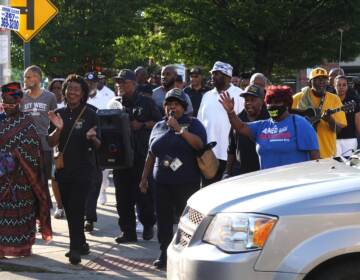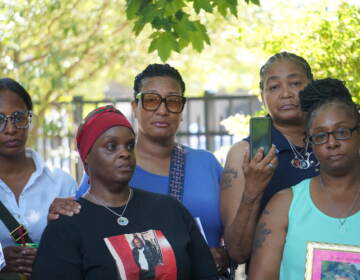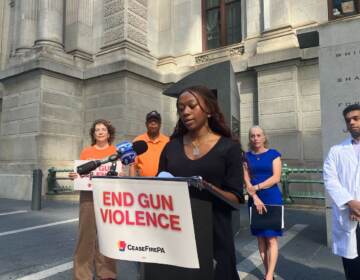The Bipartisan Safer Communities Act is law. What comes next?
The Bipartisan Safety Act was hailed on a national basis for the potential of changing state laws. But could it shape red flag laws in Pennsylvania?
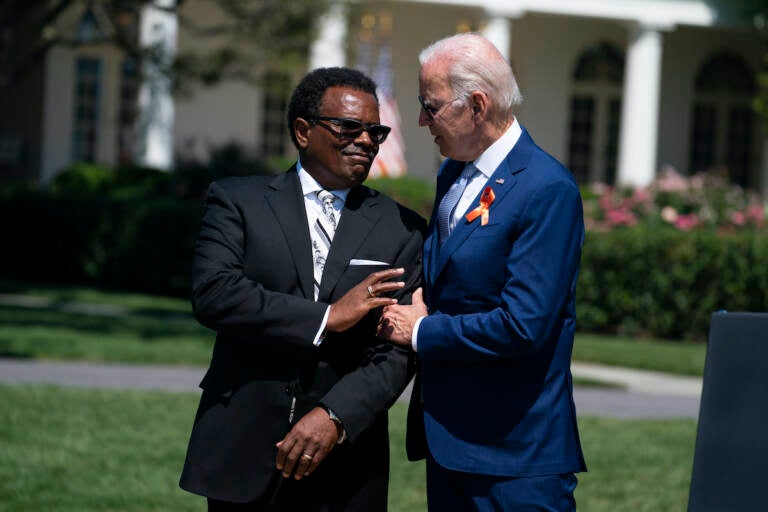
President Joe Biden talks with Garnell Whitfield Jr., who lost his mother Ruth Whitfield in the Tops market mass shooting in Buffalo, during an event to celebrate the passage of the ''Bipartisan Safer Communities Act,'' on the South Lawn of the White House, Monday, July 11, 2022, in Washington. (AP Photo/Evan Vucci)
Following the passage of the Bipartisan Safer Communities Act in June, Pennsylvania Democrats urged both the public and lawmakers on both sides of the aisle to adopt a state-wide set of red flag laws.
Met with opposition from the National Rifle Association and a lack of support by Republican colleagues, State Sen. Art Haywood, who serves parts of both Montgomery County and Philadelphia County, and U.S. Rep. Dwight Evans, who serves most of Center City, West, and Northwest Philadelphia, forged ahead anyway, holding a press conference in June to discuss the benefits of accepting the federal incentives.
“My current view is that in order to move red flag legislation forward, we’re going to need to get some new members of the state Senate in the November election,” Haywood said in a follow-up interview. “We need 26 votes and I can get 20 to 21 on the Democratic side. Of course, that still leaves getting another five.”
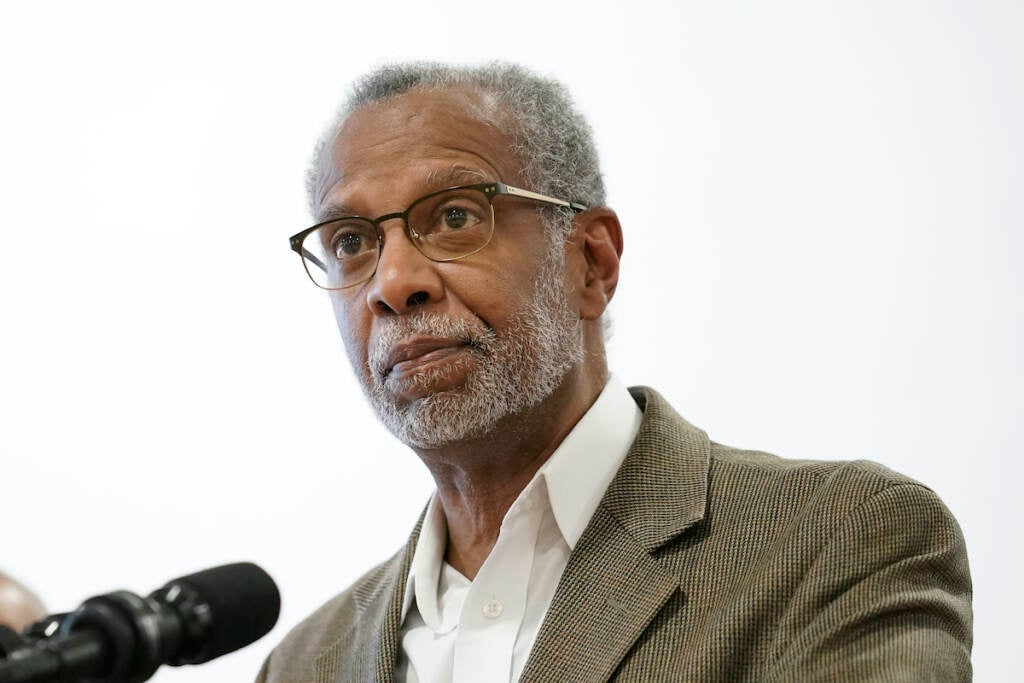
Some of those votes were lost to recent elections. Former State Senator Tom Killion, a Republican who represented Delaware County, wrote HB 2060. Along with Pa. Rep. Marguerite Quinn, Killion’s bill, signed into law by Gov. Wolf in 2018, protects survivors of domestic abuse by temporarily repossessing guns from domestic abusers under ‘final protection from abuse’ orders. Killion said that the passage of that bill was hard, and passing red flag laws would be even harder: “It’s a heavy lift in Pennsylvania because [of] the NRA … it’s a very pro-gun state.”
The NRA has been a constant opponent of gun policy reform across the United States. Leading up to 2020 elections, the organization supported former President Donald J. Trump with over $16 million in funding, with another $12 million going to congressional candidates. It has also been a staunch opponent of research projects aiming to detail the negative effects of owning guns, including supporting the Dickey Amendment of 1996, which cut gun violence research funding by nearly 90% in some cases.
The passage of the Bipartisan Safer Communities Act by the federal government offers a $750 million dollar incentive for states to adopt red flag laws of their own, which states do not have to accept. The alternative, leaning into enforcement of other parts of the act, could take time to become reality.
Swing states like Pennsylvania are being observed by federal lawmakers for their response. This week, Chris Murphy, the junior Senator from Connecticut, met with Philadelphia community leaders to discuss what red flag laws would mean for Philadelphia and the whole of Pennsylvania.
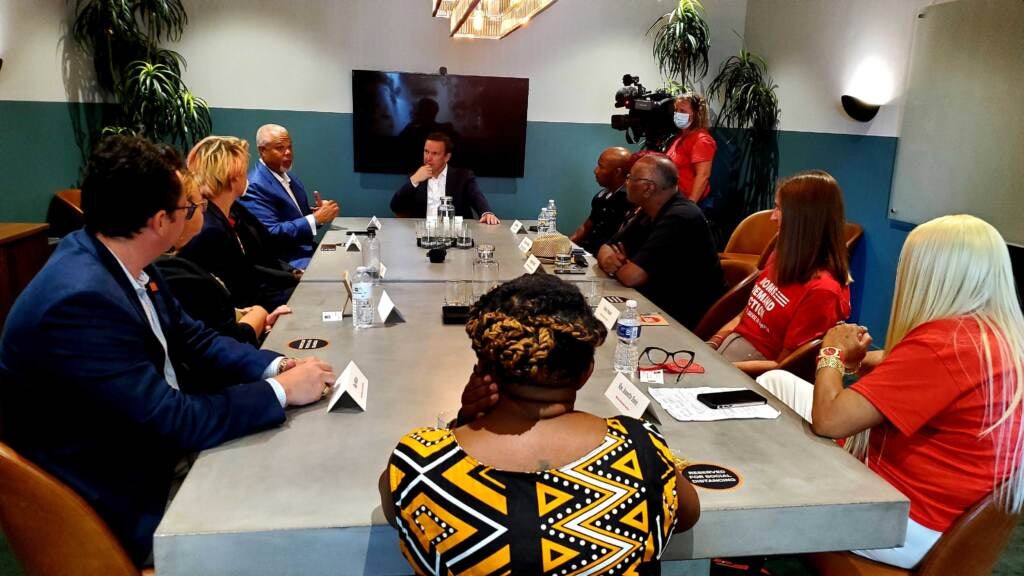
Murphy broke down the Bipartisan Safer Communities Act into four parts, first highlighting the hundreds of changes to current gun law, the incentive for red flags laws, and closure of the ‘boyfriend loophole’ (previous laws framed domestic gun abuse within the framework of a spousal relationship).
“We treat under-21 purchases differently now, including a waiting period and a phone call to the local police department,” Murphy added. “So now any time a young person under 21 goes to buy a gun, the FBI has to call… if we’re smart about working with police departments they will have a protocol about what to do with that phone call — they will go check to see if that kid is somebody that they know about as a kid in crisis.”
Lastly, the act changes the definition of what it means to be engaged in the sale of firearms.
“Right now, you’ve got a lot of people who are selling weapons online on the Internet… but they don’t register as a firearms dealer, meaning they don’t have to do background checks,” said Murphy. “That’s how a lot of these guns get into Philadelphia. More people are now going to have to be licensed as firearm dealers.”
Finally, the act includes a federal prohibition on gun trafficking, with a framework similar to drug trafficking in terms of arrests, prosecution, and punishment.
Leaders in the room asked for more inclusive voices to be included in the rollout of the new law, better allocation of funding, and more trauma-informed resources, with many saying that there are opportunities for solutions being missed because there has not been ample space to hear new voices. Broken families, limited access to resources, and mental health care were also highlighted, with collective agreement that gun violence is a “multi-pronged” problem and will need similar solutions.
“I take… comments about culture and root causes,” said Senator Murphy. “I just think it is important to repeat that had [that] altercation ended up in a fistfight or something, you wouldn’t be here.” he said, referencing Aleida Garcia’s story about the 2015 murder of her son in Philadelphia.
“Right,” Garcia replied, nodding as the Senator continued.
“And so it is important to get to the root cause of violence, but it is also really important to make sure that every car doesn’t have an illegal gun in the trunk,” Murphy said. “Because that’s how the stuff that happens everywhere in the world [like] arguments [and] fights, in this country turn deadly… We can do both: we can be unapologetic about the fact that guns are a huge part of the problem and saying that doesn’t mean that we aren’t serious about the underlying causes.”
At June’s press conference pushing for a Pennsylvania red flag law, State Sen. Haywood was hopeful that the money provided by the Bipartisan Safer Communities Act would be enough of a catalyst to motivate Republican colleagues, but admitted that a change to the political makeup of Harrisburg and increased public awareness were likely the only practical answers.
“These dollars, I think, will help to create an additional reason for my colleagues in Harrisburg to adopt the red flag legislation,” he said. “I consider it to be a powerful incentive because it means that the state wouldn’t have to pay … nor would the cities.”
“Even after the national legislation was passed, after the incentives were shared, [there was] still no willingness to go forward.” Haywood said. “We in Pennsylvania, unfortunately, have a majority in the General Assembly [that] is pretty much a ‘guns everywhere’ crowd. And so the ‘guns everywhere’ agenda dominates Harrisburg, more so now than in my first four years. So we really need to change who’s in Harrisburg to save lives.”
Sam Searles is a Report for America corps member covering gun violence and prevention for WHYY News.
If you or someone you know has been affected by gun violence in Philadelphia, you can find grief support and resources here.
WHYY is your source for fact-based, in-depth journalism and information. As a nonprofit organization, we rely on financial support from readers like you. Please give today.


